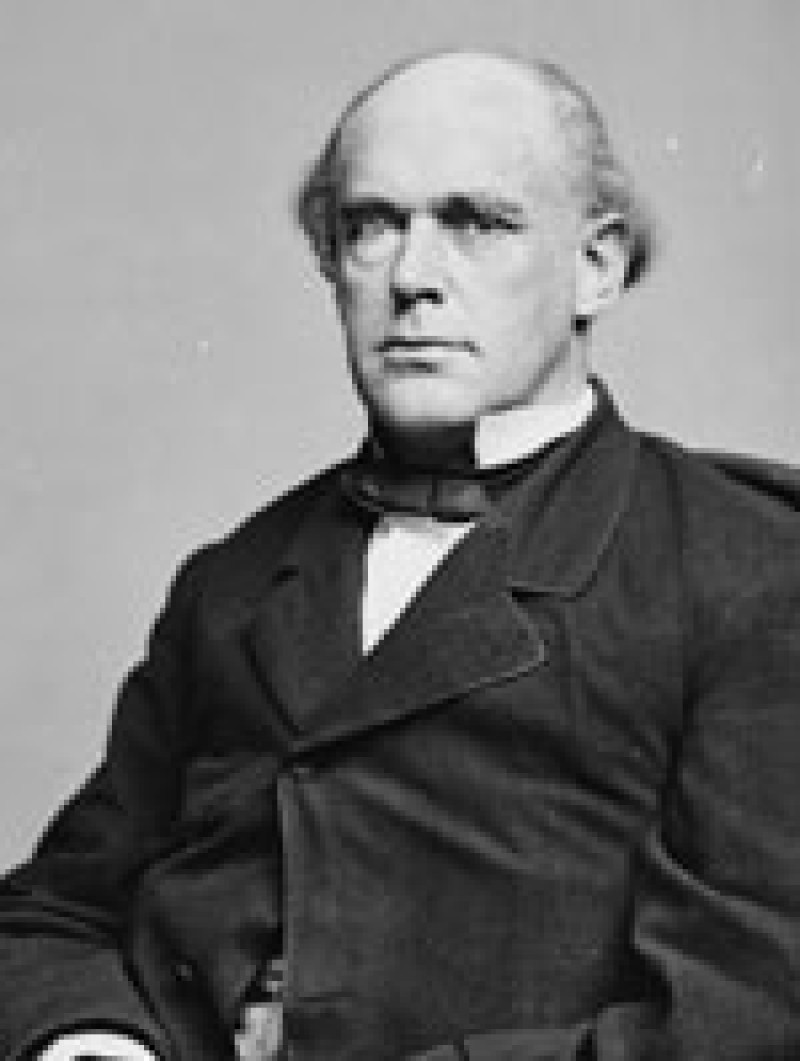Salmon Portland Chase (Jan. 13, 1808 - May 7, 1873)
Salmon Portland Chase, statesman, antislavery leader, and chief justice of the U.S. Supreme Court, was born in Cornish, New Hampshire. When Chase was nine years old, his father died. To ease the financial burden on his mother, Chase, the eighth of 11 children, moved to Ohio and lived with his uncle Philander Chase. In 1824 he entered Dartmouth, where he became deeply involved in the revival movement then sweeping the college. The revival experience reinforced his religious commitments and generated within him an intense and lasting struggle between his faith and his already quite-active ambition.
After graduating in 1826, Chase moved to Washington, D.C., where he started a school for the children of the community's privileged and studied law under the tutelage of Attorney General William Wirt. Three years after arriving in Washington, Chase moved to Cincinnati in search of ?Fame's proud temple.? Within a few years he had achieved a reasonable standing as an attorney, numbering among his clients the Cincinnati branch of the Bank of the United States and authoring an important three-volume edition of the statutes of Ohio (1833-1835).
Reawakened to the demands of the religious beliefs originally instilled in him during his childhood stay with his uncle and revival experience, Chase determined to direct his growing ambition toward causes more consistent with the teachings of his faith. Initially this renewed commitment led to his involvement in the American Sunday School Union, but by 1837 Chase was becoming seriously interested in the slavery issue. In that year he defended in court the freedom of Matilda, a slave whose master had taken her into Ohio.
Proceeding from the assumption that the Constitution was fundamentally an antislavery document, Chase resolved to organize a political force that would realize the founders' original intent. Through the numerous state and national party platforms and addresses he authored, Chase pressed for what would soon become standard antislavery demands such as an end to slavery in the District of Columbia, the banning of slavery from the west and the prohibition of the interstate slave trade.
The broad-based antislavery coalition Chase had worked for was now in place, and he would be one of its first beneficiaries. Holding a balance of power in the new Ohio legislature, Free Soil representatives gained Democratic support and, early in 1849, elected Chase to the U. S. Senate.
The Ohio legislature elected Chase to the Senate early in 1860, and in 1861 the governor of Ohio chose him as a delegate to the Washington Peace Conference. There he opposed any accord that would take effect before the inauguration of Abraham Lincoln and specifically attacked the Crittenden Compromise as too favorable to the south.
Appointed by Lincoln as secretary of the Treasury, Chase, after some hesitation, urged the president to resupply Fort Sumter. By then he was ready to accept the coming conflict. Sadly he concluded, ?The truth is that God seems to be punishing [us] for our sins — among the greatest I believe [is] that of complicity with slavery.?
By the close of 1861 it was clear that the war would not be as short as most northerners had thought and that the financial demands on the government would be far greater than originally predicted. To satisfy these expanding requirements, in early 1862 Chase obtained congressional approval for the circulation of paper money as legal tender.
Within six months, Lincoln appointed Chase chief justice of the U. S. Supreme Court, a position he had long coveted. The country was in the process of redefining its federal system and Chase would have the opportunity to influence the outcome. Uninhibited by his position on the bench, he often reiterated his long-held support for universal male suffrage and made clear his opposition to military government in the south.
Chase's most celebrated involvement in Reconstruction was his role as presiding officer in the Senate impeachment trial of President Andrew Johnson. Angering Senate radicals who hoped to turn the event into a political contest, Chase ruled that the trial had to be conducted as a formal judicial proceeding.
Some content and graphic elements featured on webpages related to the Thomas J. Moyer Ohio Judicial Center were used with the permission of the Ohio Historical Society; the Prints and Photographs Division of the Library of Congress; the Office of the Curator of the Supreme Court of the United States and American National Biography Online.
Biography of Salmon P. Chase (Jan. 13, 1808 - May 7, 1873)
Citation: Stephen E. Maizlish. "Chase, Salmon Portland"; http://www.anb.org/articles/04/04-00222.html; American National Biography Online Feb. 2000. Access Date: Fri Oct 3 10:01:17 2003. Copyright © 2000 American Council of Learned Societies. Published by Oxford University Press. All rights reserved.
Portrait of Salmon P. Chase - Library of Congress, Prints & Photographs Division.

